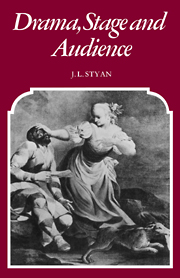Summary
A play works by the exhibition of details that are seen and heard. These are the vocabulary of drama, and an audience learns it by its constant perception. Occasionally the senses other than sight and hearing are evoked: Othello forsakes his role as priest to bend over the sleeping rose Desdemona, ‘I'll smell thee on the tree./ Oh balmy breath’, or persuades us of her death as he touches her, ‘Cold, cold, my girl?’, just as with Lear we seem to feel Cordelia's cheeks, ‘Be your tears wet? yes, faith’, and with the Messenger kiss Cleopatra's ‘bluest veins’ before she strikes him. But eyes and ears are properly the agents of perception in the theatre, whose stimuli to be effective must be specific.
At its peril does a play begin with ideas, abstractions, themes, intellection. It is for the audience to take from the play the impressions and images from which to construct its concepts: by this act of apparent discernment it enjoys the excitement of apparent discovery. A play is poetry, something made; it is drama, something done; and theatre, something perceived. Schopenhauer argued that a work of art must be perceptual before it could carry allegorical or any other value, and to be perceived the work must be particular. ‘God preserve us from generalizations’, was the watchword of Chekhov the writer. Do nothing in general, for ‘generality is the enemy of art’, urged Stanislavsky the actor.
- Type
- Chapter
- Information
- Drama Stage and Audience , pp. 31 - 67Publisher: Cambridge University PressPrint publication year: 1975



